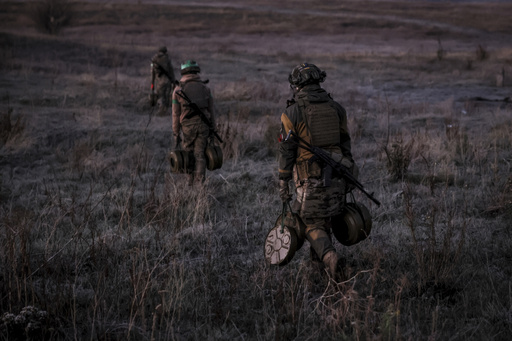
KYIV, Ukraine — The Ukrainian military is facing a troubling wave of desertion that is severely impacting its ability to maintain personnel levels and execute strategic plans amid its ongoing conflict with Russia. As the war continues, the potential consequences of this trend could weaken Ukraine’s stance in future peace negotiations.
Amid a backdrop of resource shortages, many Ukrainian soldiers have chosen to abandon their posts and combat roles, leaving their units weakened and defensive lines compromised. This alarming trend has been confirmed through accounts from soldiers, attorneys, and officials within Ukraine’s military. Reports suggest that some units have entirely vacated their positions, leading to aggravated territorial losses and leaving critical areas vulnerable.
A range of factors contributes to this phenomenon, including soldiers taking medical leave and not returning, along with confrontations between troops and their commanders during battles. “This issue is paramount,” remarked a military analyst from Kyiv, indicating that the desertion rates will likely escalate as the conflict persists into its third year.
Despite also grappling with desertions, Russia’s challenges have drawn attention away from the systemic issues troubling the Ukrainian military. Problems stemming from ineffective mobilization strategies and stretched frontline forces have come to the forefront, particularly as the U.S. has encouraged Ukraine to draft additional troops, including those as young as 18.
Recent conversations with deserters, military leaders, and lawyers shed light on the stark realities facing Ukrainian servicemen. High-ranking officials have noted, on the condition of anonymity, that this crisis has put tremendous strain on Kyiv’s military management, showcasing how the flawed mobilization efforts have led to an influx of desertions.
As a distressing statistic, over 100,000 soldiers have faced charges related to desertion since the onset of the conflict in February 2022, with nearly half of these incidents occurring in the past year. This is particularly concerning given that there were around 300,000 Ukrainian troops engaged in the fight before the recent mobilization campaign commenced. Some experts estimate that the real figure for deserters could be as high as 200,000.
The human cost of this desertion epidemic is profound. Many soldiers granted medical leave find themselves unable to return to the battlefield, grappling with psychological scars and feelings of guilt and anger over the direction of the conflict. “Staying silent about such a significant issue only harms our country,” shared one soldier who openly discussed his choice to desert.
The impact of desertion is translating into operational failures for the Ukrainian military, with some units experiencing significant losses as entire teams abandon their posts during crucial moments. Instances have been reported where troops left combat areas, directly leading to fatal outcomes for their comrades who were left defenceless against enemy attacks.
One officer from the 72nd Brigade noted that this desertion factor significantly contributed to the loss of the strategic town of Vuhledar, which fell in a rapid time frame during October. He underlined that troop morale waned as conditions deteriorated, with his unit being stretched unmanageably thin in the weeks leading up to Vuhledar’s fall.
The challenges do not end with front-line combat. Prosecutors and military personnel are generally reluctant to pursue desertion charges unless all attempts to bring deserters back have failed. According to military officials, some soldiers return temporarily, only to desert again. The official stance indicates that psychological support is provided, though the on-the-ground impacts of excessive desertions and their implications for military strategy have gone largely unexamined by high-ranking authorities.
Defending soldiers charged with desertion is no easy task, as attorneys focus on the psychological and emotional states that may have led to soldiers leaving their posts. Concerns are growing regarding the potential for setting precedents, as many soldiers may cite psychological distress as justification for abandonment given the high levels of stress and trauma associated with frontline service.
As desertion continues to pose a dilemma for Ukraine’s military, the implications on defense and operational readiness are becoming increasingly clear. Military leaders find themselves at a critical juncture, grappling with a disheartening reality where the desertion issue must be addressed with urgency to retain strength and morale amidst an ongoing fight for national integrity.
